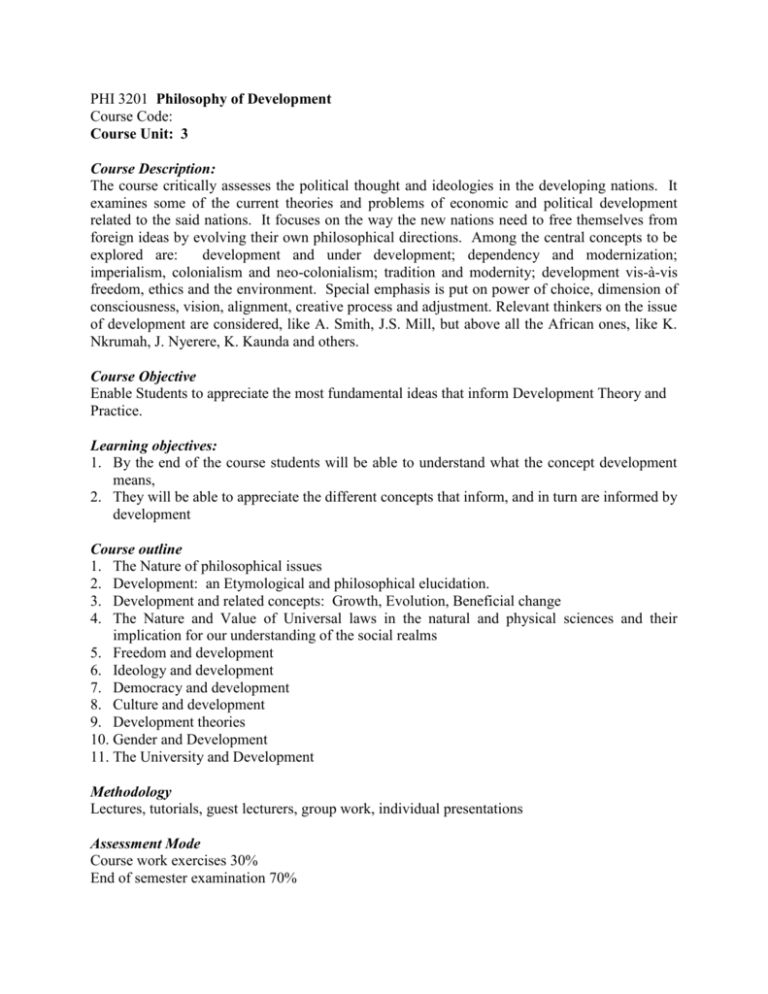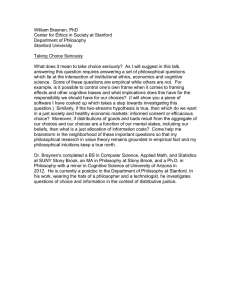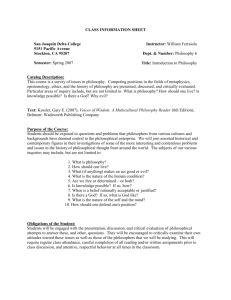PHI 3201 Philosophy of Development
advertisement

PHI 3201 Philosophy of Development Course Code: Course Unit: 3 Course Description: The course critically assesses the political thought and ideologies in the developing nations. It examines some of the current theories and problems of economic and political development related to the said nations. It focuses on the way the new nations need to free themselves from foreign ideas by evolving their own philosophical directions. Among the central concepts to be explored are: development and under development; dependency and modernization; imperialism, colonialism and neo-colonialism; tradition and modernity; development vis-à-vis freedom, ethics and the environment. Special emphasis is put on power of choice, dimension of consciousness, vision, alignment, creative process and adjustment. Relevant thinkers on the issue of development are considered, like A. Smith, J.S. Mill, but above all the African ones, like K. Nkrumah, J. Nyerere, K. Kaunda and others. Course Objective Enable Students to appreciate the most fundamental ideas that inform Development Theory and Practice. Learning objectives: 1. By the end of the course students will be able to understand what the concept development means, 2. They will be able to appreciate the different concepts that inform, and in turn are informed by development Course outline 1. The Nature of philosophical issues 2. Development: an Etymological and philosophical elucidation. 3. Development and related concepts: Growth, Evolution, Beneficial change 4. The Nature and Value of Universal laws in the natural and physical sciences and their implication for our understanding of the social realms 5. Freedom and development 6. Ideology and development 7. Democracy and development 8. Culture and development 9. Development theories 10. Gender and Development 11. The University and Development Methodology Lectures, tutorials, guest lecturers, group work, individual presentations Assessment Mode Course work exercises 30% End of semester examination 70% Reading List 1. Mark B. Woodhouse, A Preface to PhilosophyBelmontCalifornia, Wadsworth Publishing House, 1990. 2. Peggy Rosenthal: Words and values some leading words and where they lead us. OxfordUniversity Press, 1990 3. Human Development Report (1990 – 2005) 4. David a. Croacher `Toward an ethic for Development’, in The Courier, ACP – EEC No. 137, January – February, 1993. 5. Karl R. Popper, The Logic of Scientific Discovery, London, Lunwin, Hyman, 1980. 6. F.V. Konstantnov, The fundamentals of Marxist Leninist Philosophy, Moscow, Progress Publishers. 7. Karl R. Popper, The Poverty of Historicism, London, Routledge and Kegan Paul. 8. Maurice Conforth, The Open Philosophy and The Open Society, London, Lawrence and Wishart, 1976. 9. JurgenHabermas, Knowledge and Human Interests, Translated by Jeremy J. Slhapiro, Cambridge, Polity Press, 1987. 10. JurgenHabermas, Theory and Practice, Translated by John Viertel, Cambridge, Poty Press, 1988. 11. Husserl Edmund, Idea – General Introduction to Pure Phenomenology, Translated by Boyce Gilsson, New-York, 1931. 12. William Barrett, Irrational Man, A study in Existential Philosophy, A Double day Anchor Book, Garden City, New York, 1962. 13. KwasiWiredu: Cultural Universals. 14. Ahmed Mohiddin – “The hen and the egg. Is there a direct link between Freedom and Development” . In Africa – Events (Issues to be specified). 15. John Rawls: A Theory of Justice, OxfordUniversity Press, 1980. 16. J.S. Mill. Utilitarianism, Liberty, Representative Government, London, J.M. Dent and Sons, 1957. 17. David Kaulem. “On concept of Freedom in Contemporary Africa”. A.T. Dalfovo, Readings in African Philosophy, MakerereUniversity, pp.104-117. 18. Alex Kiva – “Developing Countries, Socialism, Capitalism”, In International Affairs, A monthly Journal of World Politics, Diplomacy and International Affairs, March, 1989, pp.5463 19. Ali A. Mazrui, “Privatisation Versus the Market,” In Changing Uganda, Holger Brent Hansen and Michael Twaddle, East African Studies, Fountain Press, 1991, pp. 351-378. 20. N. Scott Arnold, “Mark, Central Planning and Utopian socialism”, InSocialism, edited by Ellen Frankel Paul and others, pp. 160-199.











